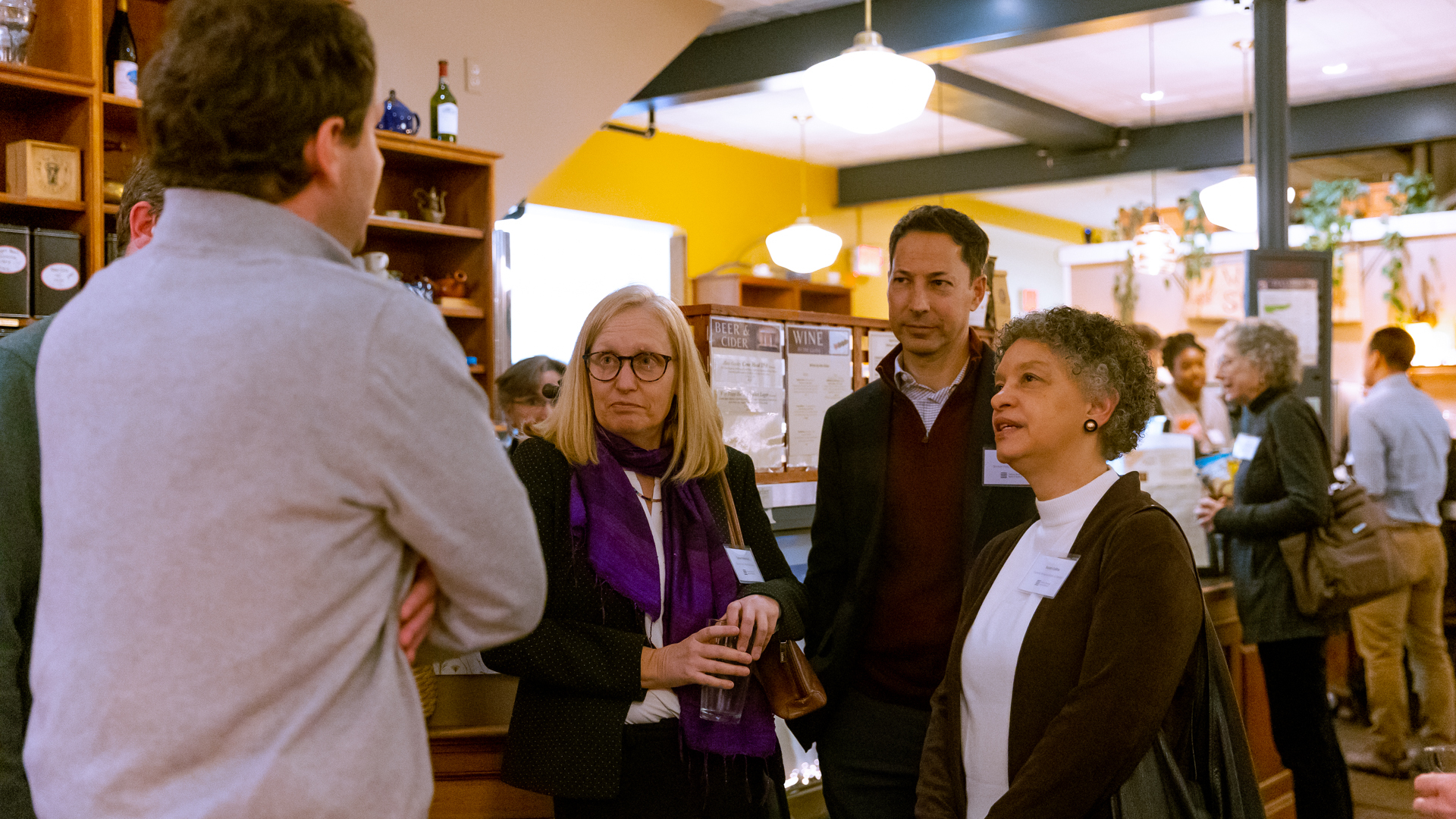Boston Fed president learns about Vermont’s key economic challenges in visit to state 
Business leaders, community members focus on housing, inflation, employment concerns 
After facing serious health issues and disability, Peter Harvey could no longer keep up with the small businesses he’d built. He sold them and struggled to make ends meet, spending a large portion of his Social Security on housing.
“I wasn’t yet old enough for most senior housing then … (but) I couldn’t keep up with my apartment rent,” he said.
But Harvey was able to connect with Randolph House, in Randolph, Vermont, the area’s first housing development for low-income seniors and younger people with disabilities. Six months later, he moved in, and now he’s been there for six years.
“My life changed drastically. I’ve been able to become part of the community here,” he said. “I continually deal with my health issues, but I feel hope and support in knowing I’m not alone.”
Harvey shared his experience with Federal Reserve Bank of Boston President and CEO Susan M. Collins during her visit to Randolph House on Wednesday. His difficulty finding affordable housing was an example of the economic challenges facing Vermonters, which Collins discussed with the Working Communities Challenge White River Valley Team.
“For me, conversations like these are incredibly important,” Collins said. “I learn a lot (about economic conditions) from data analysis, but I also learn a huge amount from talking to people on the ground. … The only way we’re going to move forward is if we continue to work together.”
8 images

Rural towns build support network through Working Communities Challenge
Collins’ visit to Vermont is part of her ongoing tour of New England to meet with leaders and community members in each state. She stopped first in Montpelier and met with the Vermont Working Communities Challenge Steering Committee on Tuesday evening. The WCC, part of the Boston Fed’s Working Places program, promotes economic development and collaboration in northern New England.
Steering committee member Ben Doyle, president of the Preservation Trust of Vermont, told Collins he sees multiple economies co-existing in Vermont, but some just aren’t sustainable anymore.
“I think now’s the time to look for new models, because the rural economy that we see is broken,” Doyle said. “What are those models that are different and, by necessity, unique for truly rural communities?”
On Wednesday, Collins spoke at the Vermont Bankers Association’s Women in Leadership Conference and met with leaders of the Vermont Agency of Commerce and Community Development. Then she headed to Randolph House for a lunch discussion with the WCC White River Valley Team, which includes 14 rural communities and focuses on improving economic opportunities for all residents, as well as increasing affordable housing.
Julie Iffland, executive director of the Randolph Area Development Corporation, said the WCC initiative provides a valuable opportunity for rural towns to network and tackle shared challenges.
“It’s very lonely to be on a three-member, small community Select Board, dealing with all the same problems that bigger places do,” she said. “Wouldn’t it be cool if we could link those (communities) in our region, so that we can provide wisdom and expertise to each other?”
Community members said a lack of affordable housing remains a significant concern across Vermont, and many residents live paycheck-to-paycheck. Royalton Select-Board Member David Barker said housing costs in his town have risen about 30% in the last few years.
“It’s a sudden and rapid increase, and wages did not keep up with that,” he said. “People can’t afford to sell their home and buy something else, or there’s just nothing available.”
Business leaders: Staffing issues, rising costs cause persistent challenges
The lack of housing also has major implications for employers, business leaders told Collins during a discussion hosted by the Vermont Chamber of Commerce at King Arthur Baking Company’s offices in White River Junction. They said it’s difficult to attract new workers to the state without accessible housing, and businesses are often competing to hire and retain employees.
Burlington restaurant owner Leslie McCrorey-Wells said she’s thankful her businesses were able to survive the pandemic with help from state and federal aid. Now, they’re trying to offer competitive wages and creative benefits to keep employees but are still facing staffing challenges.
“We’re only open five days a week, and we haven’t opened back to our full daily hours yet,” McCrorey-Wells said. “It’s just not stable, and it hasn’t been for a long time.”
At the same time, business costs are rising rapidly, business leaders said. Travis Samuels, chief operating officer at the industrial hemp processing company Zion Growers, said his team’s careful plans to buy a critical new piece of machinery were derailed by COVID-19. Then over the next two years, its price rose from $400,000 to about $780,000. Samuels said the company managed to acquire a refurbished replacement, but such a setback could end many small businesses.
“It almost made it impossible for us to move forward,” he said. “We were able to find a way, but not everyone is that lucky.”
Collins said the Fed would continue its work to curb inflation, as low, predictable inflation is important for an inclusive and resilient economy. She also highlighted the need for communities to continue to look for ways to collaborate inside and outside their borders.
“There are opportunities to be forward-looking … and to find ways to share ideas that really help empower people on the ground to come up with solutions,” she said.
Learn more about the Working Places initiative here.
Media Inquiries? 
Contact our media relations team. We connect journalists with Boston Fed economists, researchers, and leadership and a variety of other resources.

 About the Authors
About the Authors
Amanda Blanco is a member of the communications team at the Federal Reserve Bank of Boston.
Email: Amanda.Blanco@bos.frb.org
Site Topics
Keywords
- Vermont ,
- New England ,
- Working Places ,
- Working Communities Challenge ,
- Susan M Collins ,
- Regional economy






